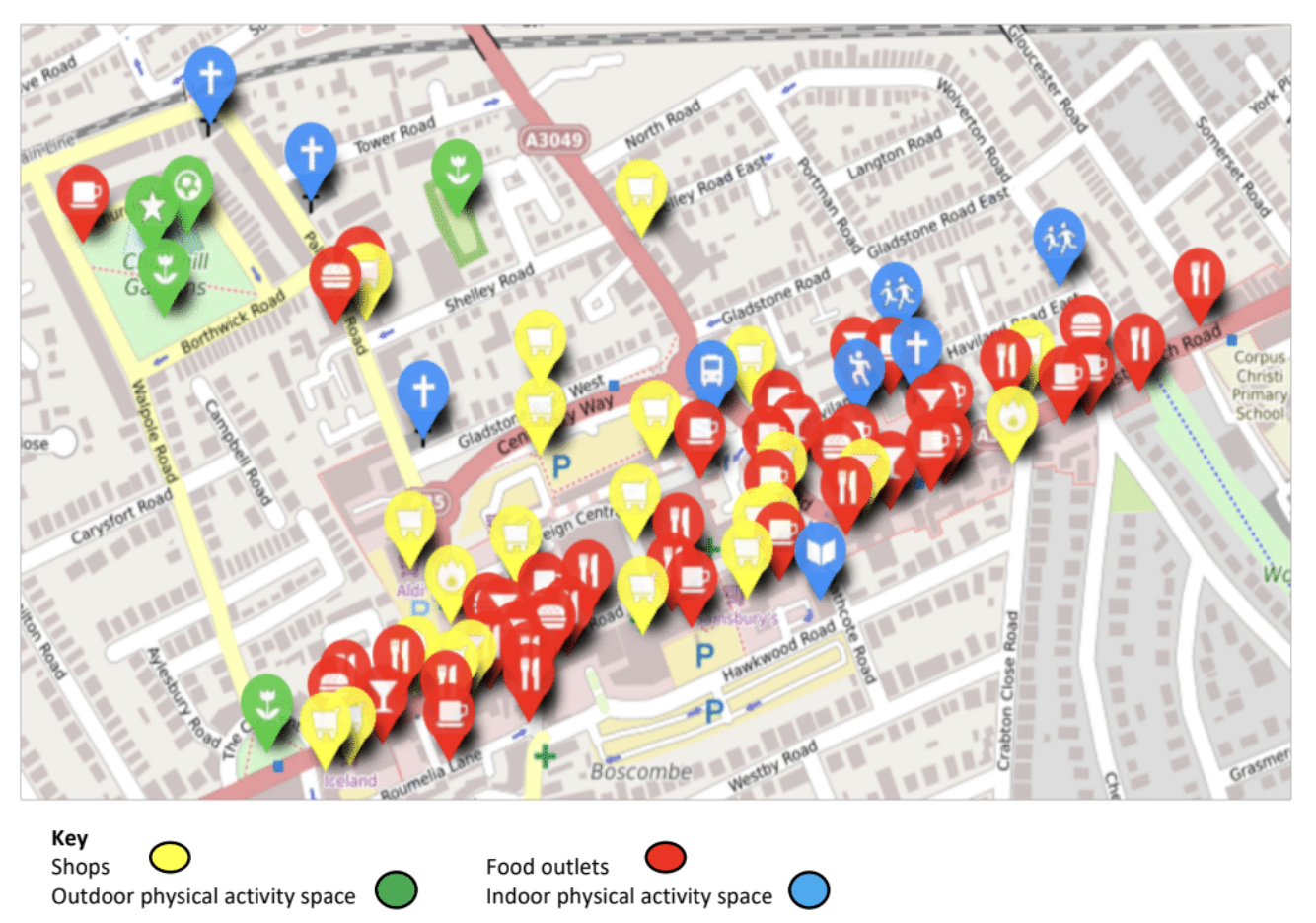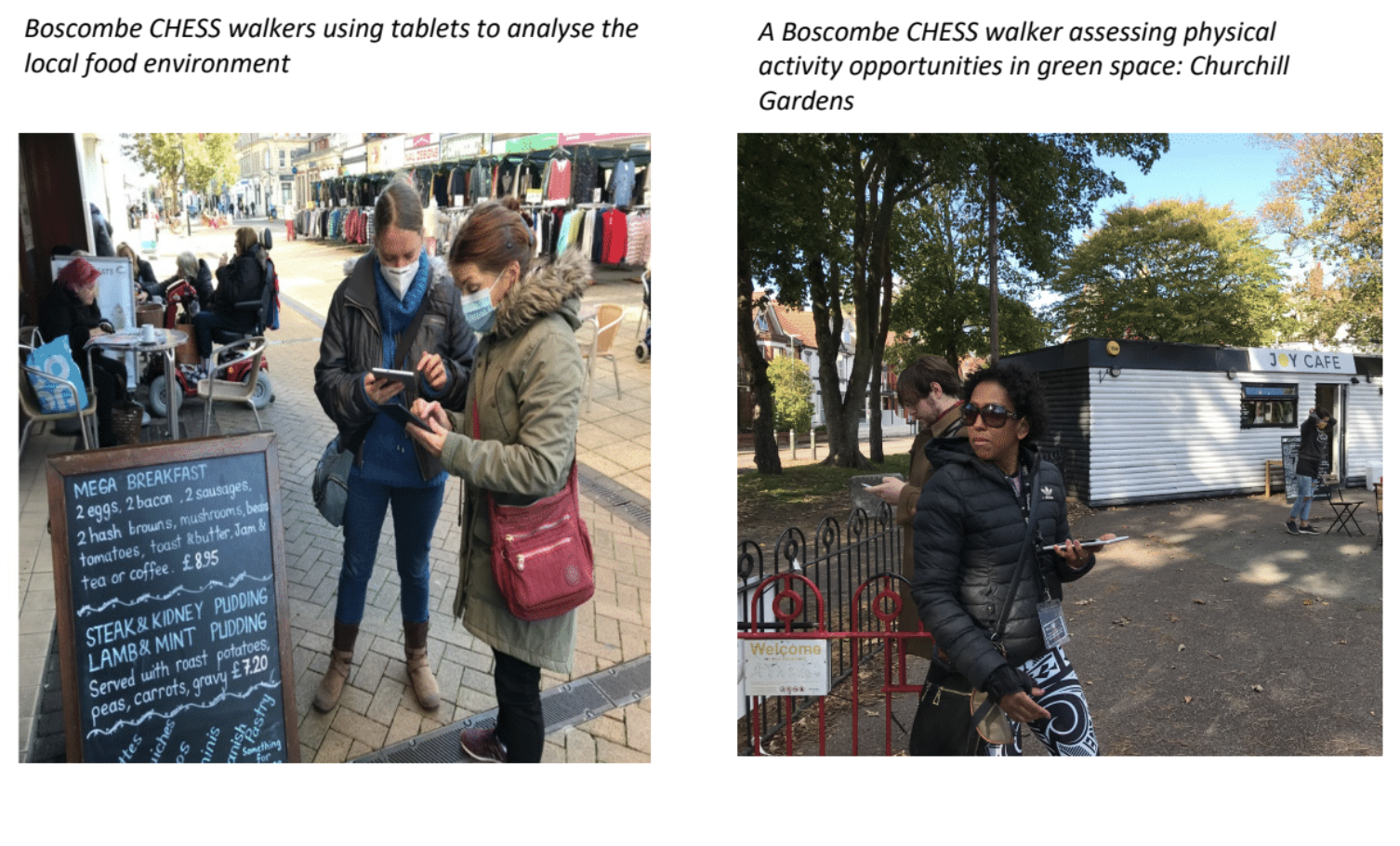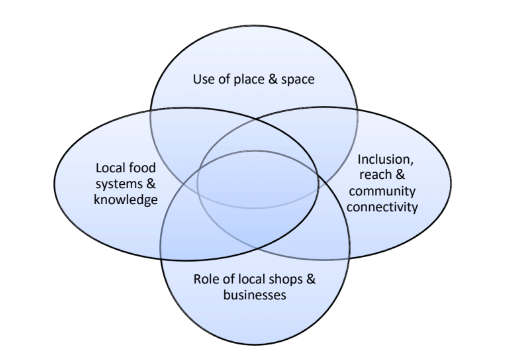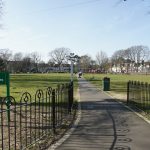In Focus: CHESS Walk in Boscombe
Last week, we saw how community members in Aylesham used C3’s innovative CHESS process to assess their community services and built environment, identifying areas of potential improvement and setting out plans to implement those improvements. This week, we’re looking at how C3 Collaborating for Health engaged with a community in Boscombe, Bournemouth, working in partnership with Bournemouth, Christchurch and Poole Council (BCP Council), in the first year of the ASPIRE project.
What is Project ASPIRE?
With Project ASPIRE, C3 is engaging with 7 different communities across the South of England and the North of France to survey their environments using CHESS, with a view to reducing obesity and enhancing employability.

More about Boscombe
Boscombe is a suburb of Bournemouth. The population of the area is about 21,000 people per the last census. 43% of children in Boscombe are living in poverty, significantly higher than the national average. The borough council’s alcohol needs assessment report shows that 14 % of Bournemouth’s ‘lower super output areas’ – geographical areas used to define deprivation – are in the top fifth for deprivation across the country, or 15 out of 110.
According to a BCP Council briefing paper published in 2019:
- Within the BCP area 9 out of 233 Lower Super Output Areas (LSOAs) – small areas or neighbourhoods with an average of around 1,500 residents each – fall within the most deprived 10 per cent in the country.
- 16 thousand people in the BCP area live in these highly deprived areas
- Entrenched deprivation exists in Boscombe and appears to be spreading into neighbouring or nearby areas
C3 found significant enthusiasm amongst community members for creating opportunities that will enable outdoors physical activity and opportunities for learning about food and the local food systems. However, there was strong consensus that creating opportunities alone is not enough, and for these to positively affect the community, the fundamental issue s of community connectivity, inclusion and reach must be addressed.
Hub
So far, the ASPIRE project has already begun building a new food hub in the ward of Boscombe West, at Churchill Gardens. This hub will enable greater engagement with target communities in the area and leave a legacy after ASPIRE has been completed.
This building will be a community hub providing community members with opportunities to gain skills and confidence with food, whilst increasing community cohesion. The hub will create a space within the community which will offer people access to locally grown produce and affordable sustainable food, opportunities to learn how to grow, prepare, cook, and store food, and be a catalyst for food-based social enterprise. The hub will also act as a pilot and hopefully a catalyst for similar hubs throughout the programme area.
The Boscombe community has been involved in the design of the hub via the CHESS™ process and other activity, allowing them to express their opinions on what action is needed in the community, and will be involved in the constant refinement of the hub design.
Meeting With Partners
C3 and BCP Council staff held multiple planning meetings, both remotely and in person. Two site visits were conducted, which enabled C3 to walk the area, capture and list the existing assets to ensure a range of assets could be mapped, plan a walking route, and visit a suitable venue that could be used as a meeting place. C3 also researched local and national data sets and local authority publications, analysing maps of Boscombe to create a digital asset map.
Community Participants
The community participants were selected by BCP Council staff based on the proximity to the planned Boscombe ASPIRE new build in Churchill Gardens, and the surrounding area was identified for the CHESS™ walk. Communities represented the local Polish community, members of the local Church congregation and parents of school-age children. On the day, participants gathered at Boscombe Baptist Church where they were delivered a presentation by C3 on NCDs and their risk factors before being each loaned a tablet with the CHESS™ app loaded onto it for the purpose of gathering data.

A walking route around the town had been identified by C3 earlier in the process, and this was followed as participants analysed the built environment in Boscombe. The CHESS™ walk in Boscombe mapped 45 assets that included:
- Shop scans
- Restaurants cans
- Outdoor and indoor physical activity area scans
- Markets stalls scans
- Street scan
Findings turned out in each of these asset classes included that chain supermarkets offer the greatest variety of fresh fruit and vegetables of different colours, that 30% of shops had signs promoting healthy eating/lifestyles while 100% of shops had signs promoting unhealthy diets. Community participants also noted that all physical activity areas are open to the public, are accessibly by public transport, are youth-friendly and are wheelchair accessible.

Conversations naturally took place throughout the walk and that related to opportunities for physical activity and healthy eating, and to the barriers faced by community members in making healthy changes. Some of these included:
- Many houses and flats have no gardens or balconies to grow your own food.
- There are not many allotments in the local area – some have been lost to housing.
- It’s not cheap to eat healthily compared to buying processed food.
- Cost is a limiting factor to joining private gyms that offer physical activity classes.
- There is high visibility of non-healthy foods inmost shops.
Insight Sessions
Once the data had been collected, C3 held a series of insight sessions for participants to join, with a view to reviewing the material and drawing conclusions regarding next steps. With regard to potential improvements to the built landscape, C3 and the participants identified 4 key overlapping themes in the review: use of place and space, local food systems and knowledge, inclusion, reach and community connectivity, and the role of local shops and businesses.

Community members were then asked to discuss in small groups their ideas and actions for each theme, and consider:
- what changes might they want to make; and
- what actions might they take as a local community
Facilitated by C3, community members then shared their small group discussions with the wider group, and the ideas from these discussions subsequently contributed to a ‘long list’ of ideas for action.
I am pre-diabetic, got myself a personal trainer, but didn’t have the time before. Am a grandparent, work part-time, help with childcare looking after the grandchildren, so it is hard to find the time for physical activity.
Around the use of place and space, ideas included providing outdoor gym equipment in Churchill Gardens, using container spaces for growing, and running physical activity classes outdoors. Around local food systems and knowledge, people suggested establishing a local fishing club, installing beehives in the area, and developing a local points-based loyalty card for use in local businesses. On the issue of inclusion, reach and community connectivity, coffee mornings, seed swap events and a community bus to take people to the seafront were all floated as ideas. Finally, regarding the role of local shops and businesses, community members suggested asking local businesses to label local produce, lobbying them to increase their organic offering, and looking for sponsorship from local businesses/organisations for things like a sponsored pocket garden.
Action Planning
The action planning session with the community members of Boscombe was conducted virtually using Zoom three weeks after the initial insight session. Participants were emailed a long list of ideas in advance – their ideas generated at the initial insight session – and encouraged to review them before the session, and to start thinking about their preferred ideas/how they might be actioned.
After initial discussion, five priority ideas were identified:
- Create opportunities for physical activity in Churchill Gardens (suggested actions: build a sheltered area for classes, install exercise equipment in the park)
- Create more growing opportunities (suggested actions: build vertical growing spaces and rooftop gardens, integrate skills and employment training into these spaces around growing and food distribution to optimise employment opportunities).
- Improve communication about what is happening in Boscombe (suggested actions: create a community Instagram account, print and disseminate leaflets in the community about local events).
- Provide cookery classes (suggested actions: use existing local teaching kitchens, collaborate with local businesses to share skills , facilities and experts on cooking and food preparation, and establish inter-generational cooking classes for skill-sharing between young and old).
It wouldn’t be difficult to get cookery classes going – they will benefit both the community and businesses!
- Organise community events (suggested actions:establish a community mini-festival “Churchill Fest!” and run other events that incorporate cooking, food, exercise, culture, and music – demonstrate what is happening in Boscombe).
Next Steps
C3 has allocated resources within its ASPIRE project budget to support implementation of the co-designed community action plan. These resources include grant monies, and funds to employ an individual to oversee delivery of the action plan.
Drawing on our experience in community engagement projects, C3 advises that the grant money is used early in the ASPIRE project, to maintain project momentum, community enthusiasm and buy-in. Previous examples of such ‘quick wins’ have included: purchasing equipment for cooking sessions; buying and fitting basketball nets; and on one occasion, the resources were used to pay the utility bill for a community centre about to close! There are also ASPIRE resources to employ a part – time project manager in Boscombe, for up to 18 months. It is expected that this person will be a Boscombe resident and recognised to have some leadership-type role within the community. The local project manager will manage the implementation of the community’s action plan and C3 will support them through regular communication and consultation.
Evaluation
Bournemouth University is the lead ASPIRE partner for evaluation and will be evaluating the whole ASPIRE project. C3 asked all community members to complete a pre-CHESS™ walk impact survey on 10 September 2020 and will ask community members to complete post-CHESS™ impact surveys after six months, one year and at project end.

ASPIRE
Find out more about C3’s work with Project ASPIRE here.

